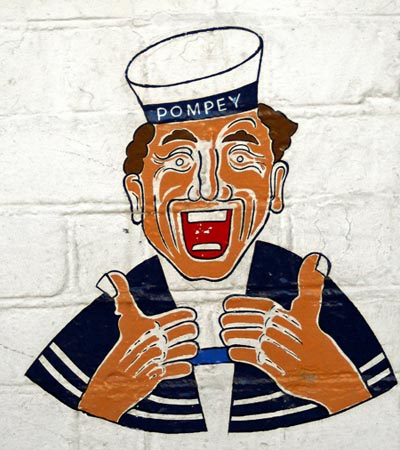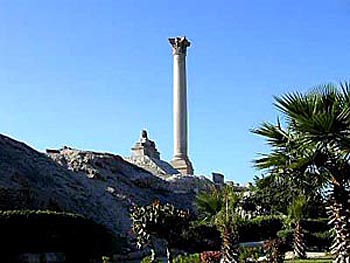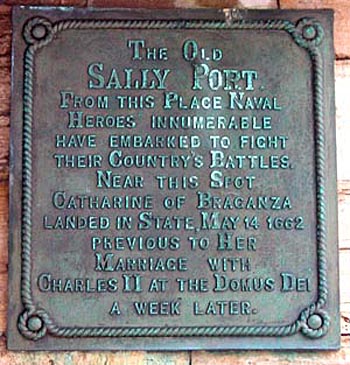Why is Portsmouth known as Pompey?

Why is Portsmouth called Pompey? Everyone knows that both Portsmouth Football Club and the city of Portsmouth, are known as Pompey, but why?
Portsmouth is commonly referred to as "Pompey" due to a longstanding and affectionate nickname that has become deeply ingrained in local culture. It is thought that the origin of this nickname can be traced back to the naval history of the city.
Sailors are well known for their use of slang and nicknames, often employing simplified or altered versions of words. In this case, "Portsmouth" was playfully transformed into the more concise and affectionate "Pompey." The tradition of using such informal nicknames is deeply rooted in naval culture, fostering a sense of identity and camaraderie among sailors.
As the nickname "Pompey" became a more widely accepted and recognized term for Portsmouth, it permeated local culture and language. Today, the use of "Pompey" has extended beyond the naval context, becoming a beloved and enduring part of the city's identity.
Nobody seems to be able to put forward a definitive answer to the question "why is Portsmouth called Pompey?" but we have listed together the most popular possible explanations of why Portsmouth is known as Pompey.
Pompey Chimes
Play up Pompey! Just one more goal! Make tracks! What ho! Hallo! Hallo! These are the original lyrics the the Pompey Chimes sung by Portsmouth fans, they originated sometime in the 1890's.
It's not known when the name Pompey was used for the first time, but the quote below was printed in the Woolwich Gazette in 1898, March 23, page 7 col. 3. In an article on football that comments on Pearson's Athletic Record (a cycling publication with county maps).
Portsmouth is "about 70 miles S. W. of London," we find ourselves somewhere handy to Portsmouth, or as our sailor friends call it "Happy Pompey, where the band plays." Our thanks to Stephen Goranson for emailing us this early reference.
Why is Portsmouth called Pompey?
A very early use of the name Pompey for the newly formed Portsmouth Football and Athletic Club appeared in the local newspaper.
"Wilkie amid tremendous cheering from the Pompey lads, won the toss, and played with the wind in their favour."
Evening News - December 9th 1899. col.6.
-
The Spithead Mutiny and Pompey
Ships involved in the Spithead Mutiny of 1797 were named Terrible, Queen Charlotte, Glory, Duke, Defiance, Ramilees and the Pompee. It is said that two delegates from each ship was invited to a meeting on the Pompee at Portsmouth. Two drunken seamen were arrested in London apparently two of the delegates, but they were so drunk all they were able to tell the authorities is that they were going to Pompee (Pompey). It is possible that all of the mutinous sailors referred to their delegates as going to Pompey. It is well known that sailors love to use of nicknames and abbreviations so maybe the term Pompey stuck as the nickname for Portsmouth.
-
Shakespeare mentions Pompey
One theory claims that the origin of the name Pompey comes from Shakespeare's Anthony and Cleopatra. In act 1, scene 4 a messenger says "Pompey is strong at sea." In scene 2 Anthony says "Sextus Pomeius hath given the dare to Caesar, and commands the empire of the sea." As Portsmouth was the home of the Royal navy and the premier naval port, the term Pompey could have evolved from the quotes about naval power and strength.
-
Aggie Weston lecture, poor old Pompey exclamation
Legend has it that a snoozing, drunken sailor on shore leave in Portsmouth, interrupted a lecture on the Roman Empire given by naval temperance worker, Dame Agnes Weston founder of the Royal Sailors Rests, 'Aggie Weston's'. When he heard that the General, Gnaeus Pompeius (Pompey) had died, the sailor shouted out 'Poor old Pompey' in a drunken slur, the name was taken up by others at the lecture and eventually moved into common usage.
-
Pompeys's Pillar
It is said that a group of Portsmouth based sailors, who climbed Pompey's Pillar near Alexandria in Egypt around 1781, became known as the Pompey Boys in recognition of their feat and that this term carried over into common usage to describe anyone from the City of Portsmouth. Pompey's pillar in Alexandria, Egypt, is a 28m high granite column, mistakenly attributed to the Roman General Pompey, but actually built as a memorial to the Roman Emperor Diocletian. The pillar is made from very smoothly worked granite, so climbing it would have been quite a challenge.
-
Pompeii to Pompey
The following explanation sounds a bit dubious, but has been suggested as a possible explanation. Portsmouth has been a port ever since Roman times, the Romans having a military base at nearby Portchester Castle. Later when the port started to be developed locals nicknamed it Pompey, likening it to Pompeii which was well known for its Roman ruins.
-
Naval Pomp and ceremony
The pomp and ceremony connected with the Royal Navy based at Portsmouth led to the adoption of the nickname, Pompey. -
Bom Bhia - Pompey
The City of Bombay in India was part of the wedding dowry of Catherine of Braganza, a member of the Portuguese royal family, when she married Charles II in 1662. As part of the marriage contract England received Tangier in north Africa and several islands in India, including Bombay. In return Portugal secured military and naval support from England as protection against Spain.
Catherine arrived in England at Portsmouth and the wedding ceremony took place at the Domus Dei at Portsmouth. Portuguese seaman in the party saw a resemblance between the two ports and may have called Portsmouth 'Bom Bhia' (Indo-Portuguese creole for Bombay) which was then Anglicised becoming Pompey.
"The points of resemblance between Bombay and Portsmouth are: both are islands; both have good harbours; the two cities are flat with the exception that Bombay has a strip of high land running from Malabar Point to Mahaluxmi, and both are only a few feet above sea level" Evening News -- December 2nd 1933 p. 3, col. 3.
-
Portsmouth Point - Pomp.P (Pompey)
Pompey is merely a drunkards slurred pronunciation of Portsmouth Point in Old Portsmouth (where in the past there were many taverns popular with sailors). Royal Navy ships entering Portsmouth Harbour used to make an entry in the ships log Pom.P (Pompey) as a reference to Portsmouth Point (this being too long). Navigational charts also used this abbreviation.
-
Going to Pompee - Going to Pompey
La Pompee was a captured French ship moored in Portsmouth harbour and used for prison accommodation, (captured 1793 and broken up 1817). The Pompee was newly built when she was captured by the Royal Navy from the French, during the Siege of Toulon in 1794. La Pompee was a Temeraire class ship of the French Navy and her capture allowed the Royal Navy to copy the design and build their own vessels using this highly successful French naval weapon. The British ships built using this copied design were known as 'Pompee Class', two of these the Superb and the Achilles fought in the Napoleonic battles of 1812. After a highly successful career in the Royal Navy, serving in many campaigns in Europe and the Caribbean, as HMS Pompee, the ship was used as a prison hulk in Portsmouth Harbour in 1816 and she was eventually broken up in 1817. The term used by prisoners being transported to the hulks being going to Pompee, or going to Pompey.
- Pompiers
Volunteer firemen in the eighteenth century (known as pompiers) used to exercise on Southsea Common. The word Pompier is French for fireman and as the first modern style fire services were developed in France in the early 18th century, it is likely the new French term was used in England also for a period. The new fire brigade at Southsea are said to have used the open space available at Southsea Common to carry out training and exercises, Pompier becoming Pompey.
-
Pompey a military slur
Pompey is well known as the Portsmouth FC nickname and another very similar theory to that above, is that the Portsmouth Football Team were formed from the team of the Royal Artillery, who were the original Pompeys. "The name was acquired in this way: At a Queen's Birthday Review the Royal Artillery were employed to line the parade instead of marching past. They were chaffed a good deal at being relegated to a job which was, in those days, done in Paris by the Fire Brigade (les Pompiers), and the next time the team turned out they were hailed as 'Pompiers' and the name stuck."
Evening News -- October 9th 1934 p. 6, col. 7.


If you have any alternative explanations as to why Portsmouth is called Pompey, or how this term originated, we would be pleased to hear from you, contact details are shown here.